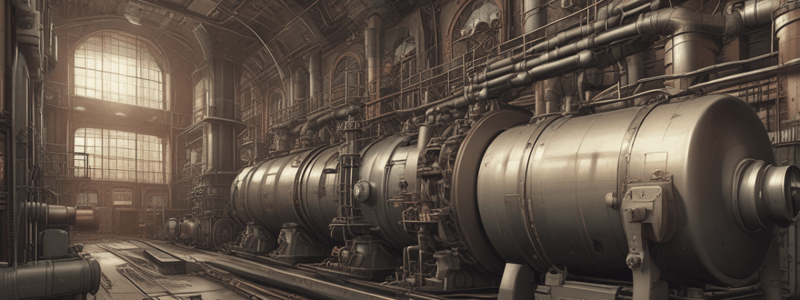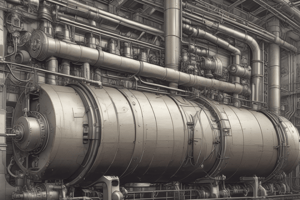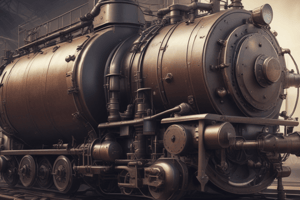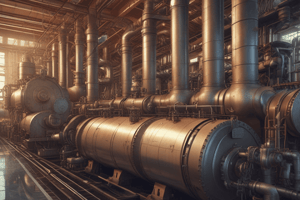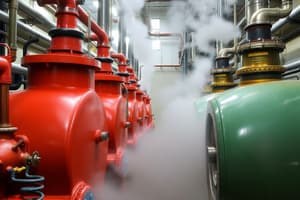Podcast
Questions and Answers
EASY Why should you use the back of your hand when checking motors for heating and vibration?
EASY Why should you use the back of your hand when checking motors for heating and vibration?
- To prevent your hand from gripping the equipment. (correct)
- Because it's a more comfortable way to check.
- To ensure you don't burn yourself.
- Because it's more sensitive than the palm.
Why is it crucial to be mindful of body position when checking rotating equipment?
Why is it crucial to be mindful of body position when checking rotating equipment?
- To ensure you're facing the correct direction.
- To avoid getting caught by loose items. (correct)
- To maintain a safe distance.
- To ensure you're not too close to the equipment.
What is the main purpose of following the STAR principle?
What is the main purpose of following the STAR principle?
- To verify the equipment's functionality.
- To maintain focus and avoid accidents. (correct)
- To check for electric shock.
- To ensure the equipment is turned off.
What does the 'S' in the STAR principle stand for?
What does the 'S' in the STAR principle stand for?
What should you do when checking any rotating equipment?
What should you do when checking any rotating equipment?
What does the 'R' in the STAR principle stand for?
What does the 'R' in the STAR principle stand for?
What should a Power Engineer do before starting a pump?
What should a Power Engineer do before starting a pump?
What is an important consideration when starting a fan?
What is an important consideration when starting a fan?
What is an important parameter to observe when starting a pump?
What is an important parameter to observe when starting a pump?
What is a general operating behaviour for a Power Engineer?
What is a general operating behaviour for a Power Engineer?
What should a Power Engineer do after starting a pump?
What should a Power Engineer do after starting a pump?
What is an important parameter to observe when starting a fan?
What is an important parameter to observe when starting a fan?
What is essential when taking any action in a boiler plant?
What is essential when taking any action in a boiler plant?
What should a Power Engineer check before starting a pump?
What should a Power Engineer check before starting a pump?
MEDIUM What is a potential hazard of wearing loose clothing or jewelry when working near rotating equipment?
MEDIUM What is a potential hazard of wearing loose clothing or jewelry when working near rotating equipment?
What is the primary benefit of using the STAR principle?
What is the primary benefit of using the STAR principle?
What should you do before taking any action on a piece of equipment?
What should you do before taking any action on a piece of equipment?
Why is it important to walk around rotating equipment?
Why is it important to walk around rotating equipment?
What should you do after taking an action on a piece of equipment?
What should you do after taking an action on a piece of equipment?
What can happen to muscles in the event of an electric shock?
What can happen to muscles in the event of an electric shock?
What is a primary reason for checking the lubricating oil level and supply before starting a pump?
What is a primary reason for checking the lubricating oil level and supply before starting a pump?
What should a Power Engineer compare the actual running parameters to when starting a pump?
What should a Power Engineer compare the actual running parameters to when starting a pump?
Why is it important for a Power Engineer to verify that a fan is not windmilling before starting it?
Why is it important for a Power Engineer to verify that a fan is not windmilling before starting it?
What is a key aspect of a Power Engineer's general operating behaviour?
What is a key aspect of a Power Engineer's general operating behaviour?
What is an important consideration for a Power Engineer when taking any action in a boiler plant?
What is an important consideration for a Power Engineer when taking any action in a boiler plant?
What is a typical parameter observed when starting a pump?
What is a typical parameter observed when starting a pump?
What is a critical aspect of a Power Engineer's approach to operating equipment in a boiler plant?
What is a critical aspect of a Power Engineer's approach to operating equipment in a boiler plant?
What should a Power Engineer do after starting a pump?
What should a Power Engineer do after starting a pump?
HARD What is the primary reason for checking the normal operating ranges before starting a pump?
HARD What is the primary reason for checking the normal operating ranges before starting a pump?
What is the consequence of not verifying the expected result after starting a piece of equipment?
What is the consequence of not verifying the expected result after starting a piece of equipment?
Why is it essential to check the suction pressure when starting a pump?
Why is it essential to check the suction pressure when starting a pump?
What is the primary benefit of following proper operating procedures in a boiler plant?
What is the primary benefit of following proper operating procedures in a boiler plant?
What is the purpose of checking the bearing temperature when starting a pump?
What is the purpose of checking the bearing temperature when starting a pump?
What is the consequence of not checking the intake screen differential pressure before starting a fan?
What is the consequence of not checking the intake screen differential pressure before starting a fan?
What is the primary reason for verifying that a fan is not windmilling before starting it?
What is the primary reason for verifying that a fan is not windmilling before starting it?
What is the key aspect of a Power Engineer's general operating behaviour?
What is the key aspect of a Power Engineer's general operating behaviour?
What happens to muscles in the event of an electric shock?
What happens to muscles in the event of an electric shock?
Why should a Power Engineer review the expected outcome of an action?
Why should a Power Engineer review the expected outcome of an action?
What is the primary reason for being mindful of body position when checking rotating equipment?
What is the primary reason for being mindful of body position when checking rotating equipment?
What should a Power Engineer do after taking an action on a piece of equipment?
What should a Power Engineer do after taking an action on a piece of equipment?
Why is it important to walk around rotating equipment?
Why is it important to walk around rotating equipment?
What is the main purpose of the 'Act' step in the STAR principle?
What is the main purpose of the 'Act' step in the STAR principle?
Match the following equipment with the parameter typically observed upon starting:
Match the following equipment with the parameter typically observed upon starting:
Match the following actions with the expected result:
Match the following actions with the expected result:
Match the following practices with their importance:
Match the following practices with their importance:
Match the following equipment checks with their purposes:
Match the following equipment checks with their purposes:
Match the following general operating behaviors with their importance:
Match the following general operating behaviors with their importance:
Match the following equipment with their specific checks:
Match the following equipment with their specific checks:
Match the following parameters with their relation to equipment starting:
Match the following parameters with their relation to equipment starting:
Match the following principles with their importance in a boiler plant:
Match the following principles with their importance in a boiler plant:
Match the following actions with the corresponding step in the STAR principle:
Match the following actions with the corresponding step in the STAR principle:
Match the following hazards with the corresponding safety precaution:
Match the following hazards with the corresponding safety precaution:
Match the following considerations with the corresponding action:
Match the following considerations with the corresponding action:
Match the following consequences with the corresponding action:
Match the following consequences with the corresponding action:
Match the following principles with the corresponding benefit:
Match the following principles with the corresponding benefit:
Match the following priorities with the corresponding action:
Match the following priorities with the corresponding action:
Flashcards are hidden until you start studying
Study Notes
Basic Operating Skills for Power Engineers
-
A Power Engineer must learn and practice essential operating skills while operating equipment in a boiler plant.
-
These skills include:
Starting a Pump
- Before starting a pump, check that:
- All valves are correctly positioned (open or shut)
- Lubricating oil level and supply is adequate
- Pump is primed and ready to go
- Feed tank and suction lines are full
- Discharge tank and pipe are ready for fluids
- Know normal operating ranges for parameters such as:
- Discharge pressure
- Suction pressure
- Flow
- Noise
- Vibration
- Lubrication
- Bearing temperature
- Verify parameters are in acceptable range after starting the pump
Starting a Fan
- Before starting a fan, verify:
- Belt condition
- Belt tension
- Lubrication oil level and supply
- Fan is not windmilling (spinning backwards)
- Intake screen differential pressure
- Typical parameters observed upon starting a fan include:
- Fan discharge pressure
- Airflow
- Damper position
- Noise
- Vibration
- Lubrication
- Bearing temperature
- Before starting a pump, check that:
General Operating Behaviours
- Always know the expected result of any action taken in a boiler plant.
- Use care when taking an action, and never turn on equipment and walk away.
- Always check equipment to confirm expected results.
- When checking motors, check for heating and vibration using the back of the hand, not the palm.
- Be mindful of body position when checking rotating equipment, ensuring no dangling items that may get caught.
- Always walk around rotating equipment, never step over a rotating shaft.
- Follow the STAR principle to maintain focus:
- Stop: Pay attention to the task at hand.
- Think: Review the expected outcome and confirm conditions.
- Act: Take the correct action on the correct piece of equipment.
- Review: Verify that the desired action took place and confirm the expected outcome.
Basic Operating Skills for Power Engineers
-
A Power Engineer must learn and practice essential operating skills while operating equipment in a boiler plant.
-
These skills include:
Starting a Pump
- Before starting a pump, check that:
- All valves are correctly positioned (open or shut)
- Lubricating oil level and supply is adequate
- Pump is primed and ready to go
- Feed tank and suction lines are full
- Discharge tank and pipe are ready for fluids
- Know normal operating ranges for parameters such as:
- Discharge pressure
- Suction pressure
- Flow
- Noise
- Vibration
- Lubrication
- Bearing temperature
- Verify parameters are in acceptable range after starting the pump
Starting a Fan
- Before starting a fan, verify:
- Belt condition
- Belt tension
- Lubrication oil level and supply
- Fan is not windmilling (spinning backwards)
- Intake screen differential pressure
- Typical parameters observed upon starting a fan include:
- Fan discharge pressure
- Airflow
- Damper position
- Noise
- Vibration
- Lubrication
- Bearing temperature
- Before starting a pump, check that:
General Operating Behaviours
- Always know the expected result of any action taken in a boiler plant.
- Use care when taking an action, and never turn on equipment and walk away.
- Always check equipment to confirm expected results.
- When checking motors, check for heating and vibration using the back of the hand, not the palm.
- Be mindful of body position when checking rotating equipment, ensuring no dangling items that may get caught.
- Always walk around rotating equipment, never step over a rotating shaft.
- Follow the STAR principle to maintain focus:
- Stop: Pay attention to the task at hand.
- Think: Review the expected outcome and confirm conditions.
- Act: Take the correct action on the correct piece of equipment.
- Review: Verify that the desired action took place and confirm the expected outcome.
Basic Operating Skills for Power Engineers
-
A Power Engineer must learn and practice essential operating skills while operating equipment in a boiler plant.
-
These skills include:
Starting a Pump
- Before starting a pump, check that:
- All valves are correctly positioned (open or shut)
- Lubricating oil level and supply is adequate
- Pump is primed and ready to go
- Feed tank and suction lines are full
- Discharge tank and pipe are ready for fluids
- Know normal operating ranges for parameters such as:
- Discharge pressure
- Suction pressure
- Flow
- Noise
- Vibration
- Lubrication
- Bearing temperature
- Verify parameters are in acceptable range after starting the pump
Starting a Fan
- Before starting a fan, verify:
- Belt condition
- Belt tension
- Lubrication oil level and supply
- Fan is not windmilling (spinning backwards)
- Intake screen differential pressure
- Typical parameters observed upon starting a fan include:
- Fan discharge pressure
- Airflow
- Damper position
- Noise
- Vibration
- Lubrication
- Bearing temperature
- Before starting a pump, check that:
General Operating Behaviours
- Always know the expected result of any action taken in a boiler plant.
- Use care when taking an action, and never turn on equipment and walk away.
- Always check equipment to confirm expected results.
- When checking motors, check for heating and vibration using the back of the hand, not the palm.
- Be mindful of body position when checking rotating equipment, ensuring no dangling items that may get caught.
- Always walk around rotating equipment, never step over a rotating shaft.
- Follow the STAR principle to maintain focus:
- Stop: Pay attention to the task at hand.
- Think: Review the expected outcome and confirm conditions.
- Act: Take the correct action on the correct piece of equipment.
- Review: Verify that the desired action took place and confirm the expected outcome.
Basic Operating Skills for Power Engineers
-
A Power Engineer must learn and practice essential operating skills while operating equipment in a boiler plant.
-
These skills include:
Starting a Pump
- Before starting a pump, check that:
- All valves are correctly positioned (open or shut)
- Lubricating oil level and supply is adequate
- Pump is primed and ready to go
- Feed tank and suction lines are full
- Discharge tank and pipe are ready for fluids
- Know normal operating ranges for parameters such as:
- Discharge pressure
- Suction pressure
- Flow
- Noise
- Vibration
- Lubrication
- Bearing temperature
- Verify parameters are in acceptable range after starting the pump
Starting a Fan
- Before starting a fan, verify:
- Belt condition
- Belt tension
- Lubrication oil level and supply
- Fan is not windmilling (spinning backwards)
- Intake screen differential pressure
- Typical parameters observed upon starting a fan include:
- Fan discharge pressure
- Airflow
- Damper position
- Noise
- Vibration
- Lubrication
- Bearing temperature
- Before starting a pump, check that:
General Operating Behaviours
- Always know the expected result of any action taken in a boiler plant.
- Use care when taking an action, and never turn on equipment and walk away.
- Always check equipment to confirm expected results.
- When checking motors, check for heating and vibration using the back of the hand, not the palm.
- Be mindful of body position when checking rotating equipment, ensuring no dangling items that may get caught.
- Always walk around rotating equipment, never step over a rotating shaft.
- Follow the STAR principle to maintain focus:
- Stop: Pay attention to the task at hand.
- Think: Review the expected outcome and confirm conditions.
- Act: Take the correct action on the correct piece of equipment.
- Review: Verify that the desired action took place and confirm the expected outcome.
Studying That Suits You
Use AI to generate personalized quizzes and flashcards to suit your learning preferences.
